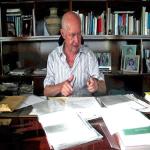30 September 2010

Photo: VOA - N. Morley
Glafcos Clerides, president of the Republic of Cyprus from 28 Feb 1993 to 28 Feb 2003, Sep 2010
As Cyprus marks 50 years of independence, under the cloud of a 36-year division, former presidents Glafcos Clerides and George Vassiliou talk to VOA about the country they both helped to mold and their hopes for unity.
For 92-year old Glafcos Clerides, a British-educated lawyer and the first speaker of the Cypriot parliament, memories remain vivid of the young inexperienced first government of Archbishop Makarios.
"I can't describe that there were young politicians before the independence, because there was no parliament or no government elected in Cyprus," said Clerides. "There was a governor sent by the Colonial Office and he used to recruit some people round him, called executive councilors. It was an advisory body to the government, so there was not much political life in the sense that a democracy works."
One early consensus between new parliament members was they all saw a fundamental problem with the constitution, which was drawn to safeguard the rights of the nation's 100,000 Turkish Cypriots, as well as the 500,000 Greek Cypriot majority. For many it was a document that was woefully inadequate.
"There was a feeling of dissatisfaction after independence both on the Greek Cypriot side and the Turkish Cypriot side," said Clerides. "For the Greek Cypriot side, the struggle was not merely to get rid of the colonial rule, but to unite Cyprus with Greece. That was not achieved. On the other side, the Turkish Cypriots' concept, was if the British had to leave, then Cyprus must be partitioned. And they did not get that either. So there were two communities that were very disappointed."
Former President George Vassiliou remembers that the constitutional wrangling between Greeks and Turks quickly led to rising tensions and eventually outright civil war.

VOA - N. Morley
George Vassiliou, president of the Republic of Cyprus from 28 Feb 1988 to 28 Feb 1993, Sep 2010"Everybody was pleased that Cyprus was now an independent country," said Vassiliou. "But a significant percentage of the people did not believe that this was the end. Many people felt that in someway they were cheated."
Few were surprised that conflict between both communities started, which quickly spiraled into violence. By 1964, the United Nations sent a peacekeeping force that was 7,000-strong to the island.
The situation came to a head in 1974, when the military junta in Athens instigated a coup by Greek army officers in Cyprus, seeking to achieve union with Greece. President Makarios was overthrown and, just day's later, Turkey invaded, splitting the island in two.
The remnants of functioning government were presented with a multitude of problems, ranging from refugees to a collapsing economy. They were problems still being tackled a decade later when George Vassiliou became president.
"What happened after the invasion is that thousands of Cypriots went to the Middle East, and did all kinds of work there, and money they earned there they sent it to Cyprus and we developed Cyprus into an international center for offshore companies and that is what really gave Cyprus the extra boost," said Vassiliou.
South Cyprus, which is marking this Independence Day, joined the European Union in 2004 and the self-proclaimed Turkish Republic of Northern Cyprus is recognized only by Turkey. A new round of U.N.-led negotiations to end the division was initiated in late 2008 and has been described as the "last chance" for Cyprus peace.
In light of growing public pessimism about peace prospects, Clerides said the specter of a permanently divided Cyprus looms, if a solution cannot be found soon.
"The question is, as the time goes by, it becomes more difficult to solve the problem and the risks of a partition are looming in the air," he said.
Vassiliou agrees, and said, ""It's both a happy and unhappy country, people have succeeded in building their lives again. But, at the same time, they are worried about the future - not because they are afraid of being attacked or killed, but they know that this division is something that cannot stand."
The failure to agree to a deal could spell the end to any future U.N.-sponsored dialogue, and both community leaders have stressed that there is "no plan B" or other alternative.